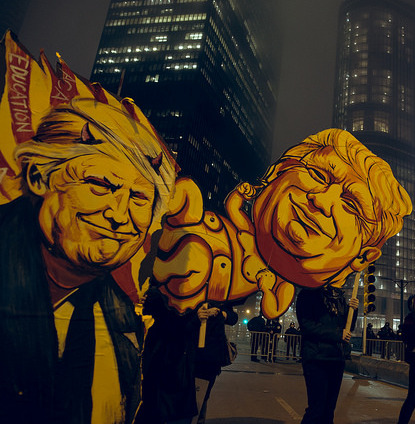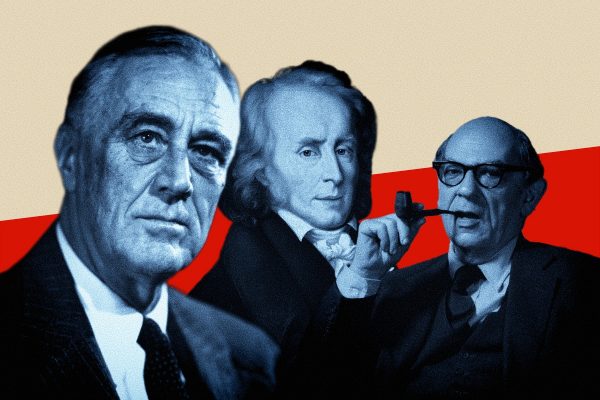At noon on January 20, 2017, a new American era began. Donald J. Trump became the forty-fifth president of the United States of America. Immense power was invested in a man with a personal history littered with misogyny, allegations of sexual assault, lawsuits, employees cheated of wages, self-aggrandizement, race baiting, and denial of science. Our president is undeniably a man with a wanting character. Granting that it is not necessary to like the leaders of a democracy, it is necessary that they grasp the responsibilities of democratic governance, including respect for free speech, reciprocal obligations, and public accountability.
In a week’s time, Trump and his proxies have trampled on the expectations of even this very low bar, throwing tantrums over crowd size, naming billionaires with no civic experience to prominent cabinet positions, and making the stunning, Orwellian claim to the existence of “alternative facts.” Alarming as each moment has been, we cannot misjudge such actions as being merely appalling statecraft. Rather, when taken as a whole, they amount to a fairly coherent set of actions that displays the traits of an emergent totalitarian regime. This is unprecedented in American history. When the president’s chief strategist declares he is at war with the press and identifies the pillars of free speech as “the opposition party,” we need to ask how many institutions will be severely weakened, maybe permanently, as an administration wantonly challenges the foundations of democratic life.
Totalitarianism is an arrangement of state power in which the ruling elite control the conditions of political and social existence while subverting the authority of individuals.
Totalitarianism is an arrangement of state power in which the ruling elite control the conditions of political and social existence while subverting the authority of individual citizens. In a totalitarian state, the will of rulers is effectively superior and morally preferable to the sense and sensibility of citizens, and all state instruments are mobilized to secure this claimed superiority. Under these conditions, the people become an agglomeration, a political organism, sustaining a regime that does not perceive any obligation to reciprocate. Indeed, such regimes insist that the duty of citizens is simply to obey, while the duty of rulers is to express their power.
Here I present five signs of totalitarianism. The presence of any one of these offenses alone casts doubt about a leader’s commitments to democratic political leadership. When they occur together, however, they raise the alarm that we may be witnessing a derailment of a political experiment that has taken two and half centuries to refine.
Sign 1: Leader Insists on Mass Public Adoration. In totalitarian states, one of the first features of public life to be deformed is public assembly. In time, all instances of public assembly—artistic, religious, sporting, festive—are recast as celebrations of the leader. To visibly celebrate anything other than the leader—or to publicly rebuke the leader—is apostasy. By now it is well known that President Trump melted down when faced with the plain evidence that his inauguration was poorly attended in comparison with President Obama’s, and when compared to protests the following day. Rather than concede the point and pledge to work hard to gain more of the American people’s affection, he berated the media the next day while presenting himself to the CIA. His defense was that from where he stood, he saw up to 1.5 million attendees, a number the evidence refutes. Such a pointed reaction indicates what we have long known about Trump: he considers his perspective supreme and if he cannot be the center of everyone’s attention, it will be a cause for resentment and anger.
Sign 2: Regime Controls the Truth. Totalitarian regimes insist that they alone know what is true; this official narrative is perfect and closed to debate. Trump’s alarmingly inconsistent relationship with the truth has been apparent for many years and throughout the campaign. Whether it be his bizarre habit of calling journalists pretending to be his own publicist, insisting they erred in a negative opinion about him; or his longstanding refusal to accept that Barack Obama is an American; or his instance that he personally writes all of his own books; or that abortions are not the barbaric spectacle he claimed in the third debate; or that millions of illegal immigrants skewed the popular vote against him, Trump has made clear that he intends whatever he says to be embraced as public doctrine. The day after the trivial debacle over inauguration attendance, Kellyanne Conway gave us a term that will be with us for at least the next four years: alternative facts. In defense of her boss’s inability to face reality, she claimed that Trump’s attendance estimates were an alternative truth. As ludicrous as this is, all Americans should pay close attention. A reader of George Orwell’s 1949 prescient dystopian novel, 1984, will recognize such an innocuous-seeming absurdity as what he calls “newspeak,” an instrument of the state to control all narratives with which it disagrees by perverting the meanings of words.
Every American should begin to ask what, exactly, does it take to make America not great.
Sign 3: Regime Suppresses Knowledge Producers. Purges of universities, media organizations, think tanks, nonpartisan government administrations, and research institutes are de rigeur under totalitarian regimes. Throughout his campaign, Trump continued to deny the role of human action in climate change, which was resonant with an earlier astounding claim that climate change is a hoax perpetrated by China. One must think carefully about what it takes to offer such a conclusion. Essentially, a leader must have distrust bordering on disdain for scientists to act from the belief that a great many highly educated people in prestigious organizations simply do not know what they are talking about. Since his election, Trump has attempted to silence the EPA, the USDA, the National Park Services, the Department of Health, NOAA, and NASA. He has frozen EPA grants to strangle scientists of funding. He has fired all top administrators in the State Department. He has threatened to defund the National Endowments for the Arts and the Humanities. His proxy, Bannon, has declared a war on the media. Trump went a step further when he stated that he would seek to “close up” the Internet. “Somebody will say, ‘Oh freedom of speech, freedom of speech.’ These are foolish people,” he scolded. Taken together, this amounts to an all-out assault on the knowledge producers best situated to challenge Trump’s approved narrative.
Sign 4: Regime Invents Common Enemies. Totalitarian regimes energize their base and forge national unity by emphasizing an “us vs. them” mentality: “If only there weren’t”—fill in the blank: Jews, immigrants, Muslims, blacks, homosexuals—“our country would achieve its intended prosperity.” Trump ran on a campaign of making America great again, an aim he proposed to achieve in large part through mass deportations, bans on Muslim immigrants, violent suppression of black protesters, and a border walls to prevent “rapist” Mexicans from entering the country. While many supposed this to be campaign bombast, Trump has already set about making good on his promises: the wall and immigration bans are already on the table. It is little surprise then that Trump would lay blame for his loss of the popular vote at the feet of immigrants. Apparently unable to accept anything other than complete victory, he returned to a lie he ought to drop in light of its widely-debunked status: that he lost the popular vote by millions because of massive voter fraud perpetrated by “illegal” immigrants. Trump holds this position despite studies showing that voter fraud of the kind he describes is virtually nonexistent in the United States. Nonetheless, by telling his followers that he perceives these “outsiders” to be a threat to the nation, he has in effect signaled that loyalty to him demands mobilizing the nation’s resources to combat this phantom menace.
Sign 5: Leader Is Surrounded by Cronies and Sycophants. Totalitarian leaders surround themselves with colluders and yes men, whom they often put through extreme tests of loyalty and whom they exile from the inner circle—or worse—at the first sign of disloyalty. Trump is so thin-skinned that it at times strains belief, from his obsessive need to defend the size of his hands to the latest debacle over the size of the inauguration crowds. Leaked reports confirm that he exists largely insulated inside of a bubble of affirmation from yea-sayers—notably his son-in-law, Jared Kushner—and quickly cuts loose those who do not automatically confirm his perspective. Meanwhile, Trump insists that he is billionaire. It may be that he is a Gatsby, but his value or indebtedness is impossible to prove, and he seems committed to never making his taxes public. His domestic and international economic ties are worth knowing—and, per the Emoluments Clause, it is likely he is constitutionally obliged to disclose them. If the Trump administration seeks to reward or punish foreign powers or institutions, the American people must know whether it is because of that national interest or his own bottom line. And this does not even begin to address the degree to which crony capitalism has shaped the contours of Trump’s entire administration. Alt-right hero Steve Bannon, Trump’s chief strategist, is most immediately known for his executive role in the ethically bankrupt Breitbart News, but he was previously a principal at worldwide juggernaut Goldman Sachs. Trump went on to nominate former ExxonMobil CEO Rex Tillerson to the position of secretary of state and Steven Mnuchin to secretary of the Treasury. The latter appointment is especially concerning. Also a former Goldman partner, Mnuchin has been strongly and credibly accused of playing a role in the loss of homes for many Americans during the 2008 housing market crisis. Andy Puzder, Trump’s pick for secretary of labor, was CEO of Hardee’s and Carl’s Jr. He opposes minimum wage and his company agreed to a $9 million settlement with its store managers for defrauding them of overtime pay. These and other appointments make clear that Trump’s primary interest is not only being surrounded by like-minded powerful men (they are all men except Betsy DeVos, who may or may not make it through confirmation for secretary of education and is also a billionaire) but by socioeconomic equals who have grown rich from the alienated labor of the economically marginal.
The ideal subjects of totalitarian rule are the people for whom the distinction between fact and fiction no longer exists.
It does not take a full-on, totally successful, or even intentional totalitarian coup to put a democracy’s integrity at risk. You just need to weaken or destabilize enough key institutions, such as the EPA, to clear the way for your preferred perception of reality; you only need to offer a few “alternative facts” to distract the public from the real ones; you only need a handful of powerful friends in powerful positions to project your worldview nationally and globally. And as all this goes on, the rule of law that differentiates a democracy from other regimes begins to twist, constantly justified by security threats real, slightly real, or completely fabricated. And the twisting and deformation is persistently justified in the name of the people who must live with the new forms of surveillance, such as registries or enhanced facial recognition. The press is told to silence itself unless willing to describe all public celebrations of the president as affecting and tremendous, while legitimate knowledge producers, such as scientists, are muzzled. Suddenly it begins to seem as if you can see Russia from your house, no matter where you live.
In her alarmingly relevant book, The Origins of Totalitarianism (1951), political philosopher Hannah Arendt writes, “The ideal subject of totalitarian rule is not the convinced Nazi or the convinced Communist, but people for whom the distinction between fact and fiction (i.e., the reality of experience) and the distinction between true and false (i.e., the standards of thought) no longer exists.” This means it is up to each and every citizen to resist by refusing the power of deception and the allure of fabrication. If the first week of Trump’s presidency is any indication, in full light of his personal history, every American, even his supporters, should begin to ask what, exactly, does it take to make America not great. The answer, you will find, is on the news every hour of every day.








